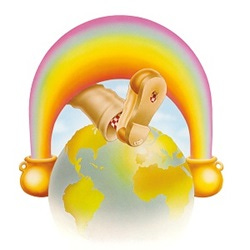The 25 Best Live Rock Recordings - No. 15: Europe '72
No. 15 - The Grateful Dead - Europe '72 (Warner Bros, 1972)
Sometimes it begins with a band that has released mostly live recordings, commercially and bootlegged. The Grateful Dead created a unique marketing paradigm over 50 years of releasing (in comparison) a scant number of studio recordings while efficiently using that studio material to provide more elaborate performances recorded live. The Wotan of jam bands, the Dead have sired children who have themselves gone on to the same success with the same paradigm, including Phish, Widespread Panic, late-period Allman Brothers Band, late-period Little Feat, Goose, Spafford, Dogs In A Pile, and a score more (not to mention spin-offs like Dead & Company, Further, Phil Lesh and Friends, RatDog, and Billy & The Kids). Rich and popular is the jam band vein.
The Grateful Dead discography is so large and unmanageable one hardly knows where to start, particularly with the live material. Since CDs and streaming, many new “complete” sets are available, most notably the 10-CD Fillmore West 1969: The Complete Recordings (Grateful Dead, 2005) and the mammoth 73-CD Europe ‘72: The Complete Recordings (Rhino, 2011) the latter from which the original Europe ‘72 three-LP set was derived. I approach this as when I first encountered the original LP version.
The Grateful Dead has demonstrated an uncanny ability to attract the “fans” who put the “fan” in fanatic. Pursue any Reddit or Quora GD thread, and you will likely find dozens of suggestions for inclusion in a list like this. The Veneta, OR 8/27/72: The Complete Sunshine Daydream Concert or Cornell 5/8/77 emerge well-liked and are indeed fine shows. But, when asked, “Where to start with Live Dead?” I always suggest the original three-LP set Europe ‘72.
Had I been born a smidge earlier, I might have chosen Live/Dead (Warner Bros, 1969) or even Grateful Dead (Skull and Roses) (Warner Bros, 1971), but they surfaced later for me. Europe ‘72 with its “I Know You Rider,” “It Hurts Me Too,” “Ramble On Rose,” and “Truckin’” began to show me what all the fuss was about. Still, Europe ‘72 is an early GD product from our vantage point in the twenty-first century. In the band’s discography, it is the third live album and their eighth album to date.
If there ever was a “cult of personality” it was so with the Grateful Dead and Jerry Garcia, in particular. Not since Bob Dylan and Neil Young had a worse vocalist captured the imagination of so many. But like those two, Garcia was immediately identifiable for his vocals. You could hear him coming from a mile away, as you could Bob Weir, an only marginally better singer than Garcia. Where the Band had an embarrassment of vocal riches in Richard Manual, Rick Danko, and Levon Helm, the Dead only had Ron "Pigpen" McKernan, and by this time, not for much longer. The Dead’s certified blues singer would die shortly after the ‘72 European Tour concluded (the tour ended May 26, 1972, and McKernan was found dead March 8, 1973).
It is worth noting that McKernan, a bona fide member of the 27 Club, died from the complications of autoimmune primary biliary cholangitis and not alcoholic cirrhosis. However, he did himself no favors with Thunderbird fortified wine and Southern Comfort as his drugs of choice. Listen to Elmore James’ “It Hurts Me Too” here and then Jimmy Reed’s “Big Boss Man” on Grateful Dead (Skull and Roses) and “Turn On Your Love Light” from Live/Dead to get an idea of McKernan depreciation in such a short time.
Those hindsight quibbles aside, there has been no band with such a dedicated following in American Popular Music. We are still listening to the Grateful Dead 50 years later. Will we be listening to Taylor Swift or Beyonce in fifty more?
The Twenty-first Century release history of the Europe ‘72 material has been interesting. The original release was reissued as a two-disc CD in 1990 and again in 2001, with bonus tracks, as part of The Golden Road (1965–1973) box set. A teaser follow-up, Europe '72 Volume 2, was released in 2011. It contains songs played on the tour but not on the original album. Not that there was any lack of music to be released. The entire tour of 22 shows was recorded resulting in the mammoth Europe '72: The Complete Recordings, a 73-CD box set. That is a lot of Grateful Dead.
Should the reader want more from the ‘72 European Tour than Volumes 1 and 2, but not the bankrupting box set, the four final shows from the tour, recorded at the Lyceum Theater in London and comprising Volumes 19, 20, 21, and 22 of The Complete Recordings should do the trick. That is a manageable amount of Dead.



Great article. I never listened to The Dead but my daughter was a Deadhead for a minute. I’m sending this to her!
Enjoying the series!